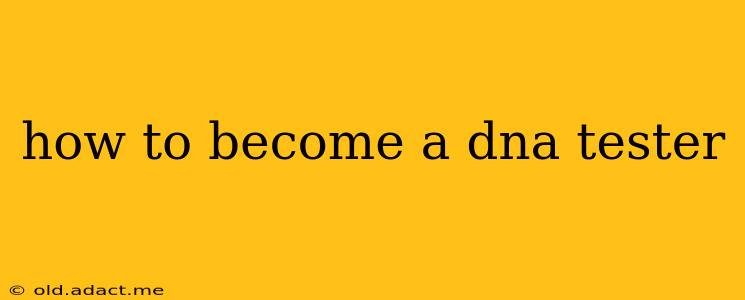The field of DNA testing is rapidly expanding, offering exciting career paths for those interested in genetics, biology, and forensic science. But how does one actually become a DNA tester? The path isn't always straightforward and varies depending on the specific area you want to pursue. This comprehensive guide will break down the steps, requirements, and considerations involved in becoming a DNA tester, covering various specializations within the field.
What Kind of DNA Tester Do You Want to Be?
Before diving into the specifics, it's crucial to define your desired specialization. The term "DNA tester" is broad, encompassing several distinct roles:
- Forensic DNA Analyst: These professionals analyze DNA samples collected from crime scenes to assist in criminal investigations. This often involves working in law enforcement agencies or private forensic laboratories.
- Clinical Laboratory Scientist (Genetics): This role focuses on analyzing DNA samples from patients for diagnostic purposes, identifying genetic disorders, and assisting in personalized medicine. They typically work in hospitals, medical laboratories, or research institutions.
- Research Scientist (Genetics): This career path involves conducting research on DNA, exploring genetic mechanisms, and developing new technologies related to DNA analysis. This often requires a PhD and may involve working in universities, research institutions, or pharmaceutical companies.
- Genetic Counselor: While not directly involved in DNA testing itself, genetic counselors play a critical role by interpreting test results and advising patients and families on genetic risks and implications. This career path typically requires a master's degree in genetic counseling.
Education and Training Requirements: A Closer Look
The educational path to becoming a DNA tester varies significantly based on the chosen specialization:
Forensic DNA Analyst:
- Bachelor's Degree: A bachelor's degree in biology, chemistry, forensic science, or a related field is typically required. A strong foundation in molecular biology and genetics is essential.
- Experience: Many forensic labs prefer candidates with prior experience in a laboratory setting, often gained through internships or entry-level positions.
- Certifications: Some certifications, such as those offered by the American Society of Crime Laboratory Directors/Laboratory Accreditation Board (ASCLD/LAB), can enhance your job prospects.
Clinical Laboratory Scientist (Genetics):
- Bachelor's or Master's Degree: A bachelor's degree in medical technology, clinical laboratory science, or a related field is generally required. A master's degree can improve career advancement opportunities.
- Certification/Licensure: Certification or licensure by relevant regulatory bodies is typically required to practice in this field, varying by location. The American Society for Clinical Pathology (ASCP) offers relevant certifications.
Research Scientist (Genetics):
- Doctoral Degree (PhD): A PhD in genetics, molecular biology, or a closely related field is usually required for research positions.
- Postdoctoral Research: Postdoctoral research experience is often necessary to gain the necessary skills and experience for independent research positions.
Genetic Counselor:
- Master's Degree: A master's degree in genetic counseling is essential for this career path. These programs typically include coursework in genetics, counseling, and medical ethics.
Essential Skills and Qualities
Regardless of the chosen specialization, several skills and qualities are beneficial for aspiring DNA testers:
- Strong Analytical Skills: The ability to analyze complex data, interpret results, and draw accurate conclusions is crucial.
- Attention to Detail: Accuracy is paramount in DNA testing, as even small errors can have significant consequences.
- Laboratory Skills: Proficiency in laboratory techniques, including DNA extraction, PCR, and electrophoresis, is vital.
- Problem-Solving Skills: The ability to troubleshoot problems and find solutions in a laboratory setting is essential.
- Communication Skills: Effective communication is necessary for interacting with colleagues, clients (in clinical or forensic settings), and patients (in clinical settings).
How to Gain Experience
Gaining practical experience is critical in this field. Consider these options:
- Internships: Seek internships in forensic labs, clinical laboratories, or research institutions.
- Volunteer Work: Volunteer opportunities in related fields can provide valuable experience and networking opportunities.
- Entry-Level Positions: Start with entry-level positions in a laboratory setting to gain practical experience and skills.
Networking and Career Development
Networking is crucial for finding job opportunities and staying updated on advancements in the field. Attend conferences, join professional organizations (such as the American Academy of Forensic Sciences or the National Society of Genetic Counselors), and connect with professionals in your chosen area.
Staying Current in the Field
The field of DNA testing is constantly evolving. Stay updated by reading scientific literature, attending conferences, and participating in professional development activities.
This guide provides a comprehensive overview of how to become a DNA tester. The specific pathway will depend on your chosen specialization and career goals. Remember to thoroughly research the specific requirements and expectations of your target role before embarking on your educational journey.
